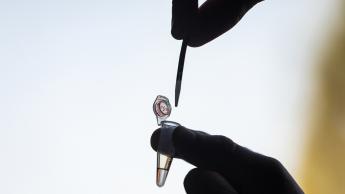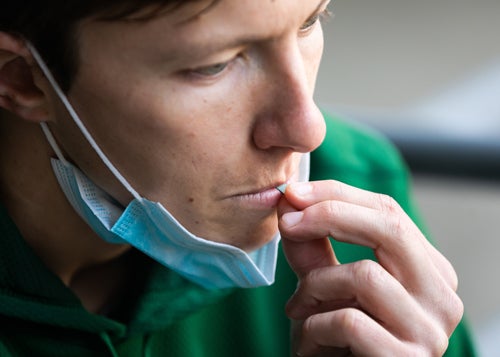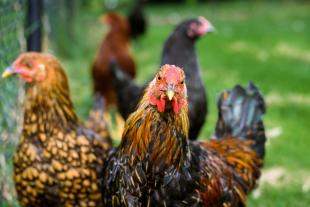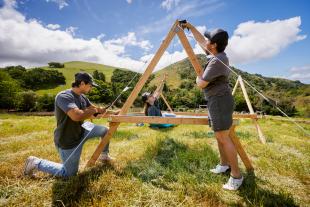Cal Poly-Developed COVID-19 Saliva Testing Technology Will be Brought to Market

Partnership with Santa Maria-based Hardy Diagnostics will Expand Scale and Use of Faculty-Developed Saliva Collection Device for Easier Virus Testing
Cal Poly has partnered with Santa Maria-based medical device manufacturer Hardy Diagnostics to bring to market saliva-based COVID-19 testing technology that was developed by members of the university’s faculty.
Cal Poly faculty and staff involved in this effort hope the technology can be utilized to further combat the COVID-19 pandemic and to address future viruses and improve healthcare technologies worldwide.
Nathaniel Martinez, associate professor of biological sciences, and Andres Martinez, professor of chemistry and biochemistry, have been developing microfluidic paper-based analytical devices (microPADs) for low-cost and portable diagnostic applications.
“This is a shining example of Learn by Doing addressing real-world problems,” said Cal Poly President Jeffrey D. Armstrong. “Our faculty members’ expertise can have a significant impact on making the fight against COVID-19 — and other similar diseases — easier and more efficient.”
Originally designed to help streamline on-campus COVID-19 testing for Cal Poly students and employees, the new device is a strip that enables saliva sample collection from the mouth in 30 seconds and is less invasive than a nasal swab. Thanks to this innovation, implemented on campus in February 2021, Cal Poly has been able to double the number of tests it runs daily, while reducing the workload required to carry out the tests.

"When placed in one’s mouth, the device automatically absorbs the exact amount of saliva required for the test and excludes potential contaminants like mucus,” Nathaniel Martinez explained. “Thanks to the improved quality of samples and consistency of sample size, the tests can be run more efficiently.”
Cal Poly’s Technology Transfer and Corporate Engagement and Innovation offices, working with the faculty members, filed for patent protection and identified commercialization partners to further develop and scale this new device with assistance from Cal Poly’s Center for Innovation and Entrepreneurship (CIE).
"This collaboration between CIE and Tech Transfer is a great model for connecting Cal Poly researchers with the resources needed to bring them to market,” said CIE Executive Director John Townsend.
“The device was developed and refined for the SARS-CoV-2 virus, but our team quickly realized it could also function as a platform saliva collection device for testing a panel of other viruses in the future,” said Jim Dunning, Cal Poly’s associate vice president of Corporate Engagement and Innovation. “We found a fantastic local partner in Hardy Diagnostics to scale this technology for the greatest public good.”
“We are pleased that the partnership with Hardy Diagnostics will take this innovative technology beyond Cal Poly to enable widespread testing and help end this pandemic,” Andres Martinez said.
Under a license agreement with the university, Hardy will further develop the device for commercialization and bring it to market. “We are very excited about the partnership and the potential future of this device,” said Jay Hardy, president of Hardy Diagnostics. “We believe that saliva testing for COVID will eventually be the dominant and preferred method, due to enhanced patient comfort and compliance.”
Don't want to miss any of Cal Poly's best news stories? Sign up for our monthly newsletter, the Cal Poly News Recap!




